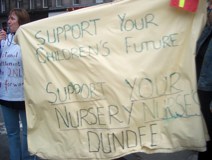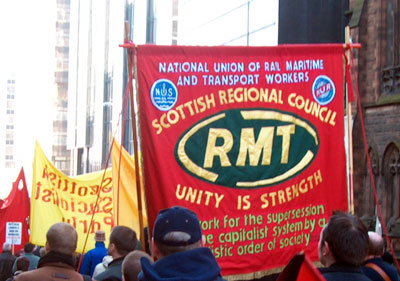Big Issue Scotland Issue 433Tough talk on youth crime - MSPs state the case The Big Issue in Scotland broke the story of how Scottish Socialist MSP Rosie Kane had begun to question whether it was appropriate for ministers to use the word 'ned'. She claimed that it is an acronym derived from the phrase "non-educated delinquent", and that the use of the word by senior politicians stigmatises young people and does nothing to get to the root of the problem, which Kane and her colleagues claim is poverty and lack of opportunities. In the media onslaught that followed, with Kane being told by the headline writers of several tabloids that she was "Off Her Ned", the debate became somewhat lost in a wrangle over political correctness and the origin of the work 'ned'. Meanwhile, the Executive ploughed ahead, recently outlining its proposals for the extension of tagging. In order to take the debate forward and help refocus it, we asked both Rosie Kane and communities minister Margaret Curran to state where they stand on the issue.Rosie Kane, Scottish Socialist Party MSP;
The Big Issue in Scotland broke the story of how Scottish Socialist MSP Rosie Kane had begun to question whether it was appropriate for ministers to use the word 'ned'. She claimed that it is an acronym derived from the phrase "non-educated delinquent", and that the use of the word by senior politicians stigmatises young people and does nothing to get to the root of the problem, which Kane and her colleagues claim is poverty and lack of opportunities. In the media onslaught that followed, with Kane being told by the headline writers of several tabloids that she was "Off Her Ned", the debate became somewhat lost in a wrangle over political correctness and the origin of the work 'ned'. Meanwhile, the Executive ploughed ahead, recently outlining its proposals for the extension of tagging. In order to take the debate forward and help refocus it, we asked both Rosie Kane and communities minister Margaret Curran to state where they stand on the issue.Rosie Kane, Scottish Socialist Party MSP;I hope readers will excuse me for not mincing my words, but anyone associated with the Executive's document, `Putting Our Communities First', should be hanging their head in shame.
The Executive seems to have invented a new crime to level at Scotland's young people - is there to be a Hanging Around (Scotland) bill? I'd like to ask communities minister Margaret Curran if the name Easterhouse Community Centre means anything to her. It's a facility in her own constituency that the local community repeatedly tried to save but which in the end fell to the Labour blitzkrieg that has flattened scores of Scotland's community facilities.
No wonder then that young people are hanging around on street corners - with the exception of very few places, there is nowhere else for them to go. Proposals to electronically tag children, place them under house arrest and threaten to send their parents or carers to jail while telling police to disperse groups of "more than two" young people has left professionals working with young people dumbstruck.
The plain fact of the matter is that poverty is the single biggest risk factor in pushing young people into anti social behaviour and then possible criminal activity.
Take Glasgow. It has 12 per cent of the Scottish population but 30 per cent of the homeless population and five times the average incidence of drug abuse. In Glasgow, 42 per cent of families are reliant on income support, compared to the Scottish average of 2 5 per cent and levels of deprivation, unemployment, mortality and chronic illness are above average.
In 1999, crimes recorded per 10,000 of population was 851 in Scotland overall; in Glasgow it was 1,431, 70 per cent above the average.
The Executive's document is clear on the responsibilities young people have to society but short on the failure of adult society to meet its responsibilities to young people. To put it bluntly, we have failed them. The Tories removed benefits from 16 to 17year-olds and the Lothian Anti Poverty Alliance estimates that this has resulted in 11,000 Scottish young adults who currently have no job nor benefits of any kind.
Labour in power has not lifted a finger to overturn this catastrophe. Sixteen to 18 year olds pay tax to the government if they work but have no say on what that government should be. They pay National Insurance if they work but receive no benefits if they are unemployed. And 16 to 18 year-olds are not eligible for NHS psychological treatment even though they may be suffering from serious problems.
Kids hanging about in groups may be an irritant for some but it is hardly of the order of problem that can appear so insurmountable to young people that they attempt to take their own life; suicide now accounts for the deaths of more young, Scottish men than road accidents. This is an increase of 70 per cent in 30 years.
There are certainly problems in Scotland in relation to anti social behaviour, criminal justice and our communities.
Children and young people that come to the attention of the Children's reporter and social work departments are the most marginalised of Scotland's youth. Many are suffering from neglect, physical, emotional and sexual abuse and violence from their parents, care givers or adults close to them. Some children need to be secured for their own and their communities' safety. But because of a lack of secure accommodation these children remain on secure orders living at home. Local Authorities are unable to cope with the pressures on them because of inadequate funding.
Many children and young people that need to be looked after cannot be due to the lack of Young People Units, Crisis Centres and foster parents. The chronic shortage of residential care staff due to stress, low pay and terrible conditions has resulted in a greater use of agency staff and a resulting constant turnover of staff. This is distressing to the children and young people who are in need of consistent, high quality care.
Tagging children may assist some young people to live at home but if it is used as an alternative to looking after children, securing them when they need to be kept safe or offering good quality services, then it will only add to the problems of children and the communities they live in.
Without adequate public funding, local authorities are unable to recruit and retain staff, maintain good quality resources for children and, most increasingly, even to provide what is statutorily necessary within the Children's Act and the Education Act.
Anti social behaviour and juvenile offending are symptoms of the problem but the root cause is the crippling poverty, social exclusion, drug abuse and hopelessness that have cut like a scythe through our communities.
Letter to The HeraldDreadful drugs failure presented as successON June 30 you uncritically presented the Scottish Drug Enforcement Agency's annual report as a success when it was in fact one of the most devastating indictments of the failure of the law-enforcement agencies in Scotland to make even the slightest of impacts on the black market in illegal drugs.
The SDEA report stated that £55m of Class A and Class B drugs were seized in Scotland by the SDEA, the police forces, Customs and Excise, and other law enforcement agencies. This was presented as a seemingly huge haul which had Jim Orr (SDEA director) and Cathy Jamieson (justice minister) patting themselves on the back for a job well done. The report implied that the law-enforcement side of the war against drugs was making good progress. Simple arithmetic suggests otherwise.
Heroin addicts spend an average of £17,500 a year maintaining their habits. There are some 30,000-55,000 opiate addicts in Scotland. Even if we exclude methadone addicts and use a conservative estimate of 30,000 Scottish heroin addicts, the lowest possible estimate of the value of the heroin market in Scotland is £525m. The UK cannabis market is estimated to be around £5bn a year (Observer, February 2, 2003). For Scotland an annual cannabis black-market estimate of £500m won't be far off the mark.
To go back to the SDEA's annual seizure of £55m, it was stated in the report that it included a single record bust of a £25m consignment of cocaine. Therefore the total of all the heroin and cannabis seized last year by all law-enforcement agencies in Scotland would be included among the remaining £30m of seizures - along with all the rest of the cocaine, ecstasy, amphetamines, and LSD intercepted.
Only when you compare this paltry £55m of seizures with the very conservative estimates of Scotland's heroin black market (£525m) and cannabis black market (£500m) do you realise that all the law-enforcement agencies put together are incapable of taking off the streets even 5% of Scotland's illegal market in Class A and Class B drugs.
But it gets worse. If the total UK black market in illegal drugs - estimated at £20bn annually - is accurate then that would mean the total black market in illegal drugs in Scotland - where drug use is higher than the rest of the UK - is closer to £2bn per annum. The SDEA, police, and Customs may therefore be intercepting around 2½% of the Scottish illegal drugs market in a record year.
This isn't a success. This SDEA report is a devastating indictment of failure being presented as its complete opposite. This report should be held up as further confirmation - if it was ever needed - that every law-enforcement initiative against drug use has made practically no difference to the amount of black-market drugs hitting the streets.
The damage that drug prohibition does to our society is bad enough without the government and its agencies trying to pull the wool over the eyes of the public in order to maintain funding for a futile and destructive war against drugs that was lost a long time ago.
Kevin Williamson, drugs spokesperson, Scottish Socialist Party, 73 Robertson Street, Glasgow.







